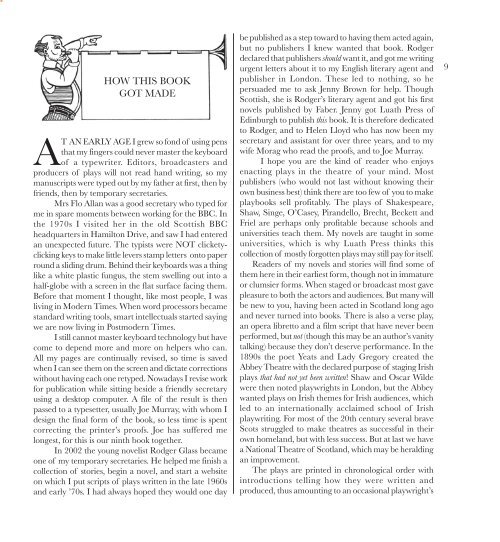A Gray Play Book by Alasdair Gray sampler
Long and short plays for stage, radio and television, acted between 1956 & 2009, an unperformed opera libretto, excerpts from The Lanark Storyboard and full film script of the novel Poor Things by Alasdair Gray.
Long and short plays for stage, radio and television, acted between 1956 & 2009, an unperformed opera libretto, excerpts from The Lanark Storyboard and full film script of the novel Poor Things by Alasdair Gray.
Create successful ePaper yourself
Turn your PDF publications into a flip-book with our unique Google optimized e-Paper software.
HOW THIS BOOK<br />
GOT MADE<br />
AT AN EARLY AGE I grew so fond of using pens<br />
that my fingers could never master the keyboard<br />
of a typewriter. Editors, broadcasters and<br />
producers of plays will not read hand writing, so my<br />
manuscripts were typed out <strong>by</strong> my father at first, then <strong>by</strong><br />
friends, then <strong>by</strong> temporary secretaries.<br />
Mrs Flo Allan was a good secretary who typed for<br />
me in spare moments between working for the BBC. In<br />
the 1970s I visited her in the old Scottish BBC<br />
headquarters in Hamilton Drive, and saw I had entered<br />
an unexpected future. The typists were NOT clicketyclicking<br />
keys to make little levers stamp letters onto paper<br />
round a sliding drum. Behind their keyboards was a thing<br />
like a white plastic fungus, the stem swelling out into a<br />
half-globe with a screen in the flat surface facing them.<br />
Before that moment I thought, like most people, I was<br />
living in Modern Times. When word processors became<br />
standard writing tools, smart intellectuals started saying<br />
we are now living in Postmodern Times.<br />
I still cannot master keyboard technology but have<br />
come to depend more and more on helpers who can.<br />
All my pages are continually revised, so time is saved<br />
when I can see them on the screen and dictate corrections<br />
without having each one retyped. Nowadays I revise work<br />
for publication while sitting beside a friendly secretary<br />
using a desktop computer. A file of the result is then<br />
passed to a typesetter, usually Joe Murray, with whom I<br />
design the final form of the book, so less time is spent<br />
correcting the printer’s proofs. Joe has suffered me<br />
longest, for this is our ninth book together.<br />
In 2002 the young novelist Rodger Glass became<br />
one of my temporary secretaries. He helped me finish a<br />
collection of stories, begin a novel, and start a website<br />
on which I put scripts of plays written in the late 1960s<br />
and early ’70s. I had always hoped they would one day<br />
be published as a step toward to having them acted again,<br />
but no publishers I knew wanted that book. Rodger<br />
declared that publishers should want it, and got me writing<br />
urgent letters about it to my English literary agent and<br />
publisher in London. These led to nothing, so he<br />
persuaded me to ask Jenny Brown for help. Though<br />
Scottish, she is Rodger’s literary agent and got his first<br />
novels published <strong>by</strong> Faber. Jenny got Luath Press of<br />
Edinburgh to publish this book. It is therefore dedicated<br />
to Rodger, and to Helen Lloyd who has now been my<br />
secretary and assistant for over three years, and to my<br />
wife Morag who read the proofs, and to Joe Murray.<br />
I hope you are the kind of reader who enjoys<br />
enacting plays in the theatre of your mind. Most<br />
publishers (who would not last without knowing their<br />
own business best) think there are too few of you to make<br />
playbooks sell profitably. The plays of Shakespeare,<br />
Shaw, Singe, O’Casey, Pirandello, Brecht, Beckett and<br />
Friel are perhaps only profitable because schools and<br />
universities teach them. My novels are taught in some<br />
universities, which is why Luath Press thinks this<br />
collection of mostly forgotten plays may still pay for itself.<br />
Readers of my novels and stories will find some of<br />
them here in their earliest form, though not in immature<br />
or clumsier forms. When staged or broadcast most gave<br />
pleasure to both the actors and audiences. But many will<br />
be new to you, having been acted in Scotland long ago<br />
and never turned into books. There is also a verse play,<br />
an opera libretto and a film script that have never been<br />
performed, but not (though this may be an author’s vanity<br />
talking) because they don’t deserve performance. In the<br />
1890s the poet Yeats and Lady Gregory created the<br />
Abbey Theatre with the declared purpose of staging Irish<br />
plays that had not yet been written! Shaw and Oscar Wilde<br />
were then noted playwrights in London, but the Abbey<br />
wanted plays on Irish themes for Irish audiences, which<br />
led to an internationally acclaimed school of Irish<br />
playwriting. For most of the 20th century several brave<br />
Scots struggled to make theatres as successful in their<br />
own homeland, but with less success. But at last we have<br />
a National Theatre of Scotland, which may be heralding<br />
an improvement.<br />
The plays are printed in chronological order with<br />
introductions telling how they were written and<br />
produced, thus amounting to an occasional playwright’s<br />
9


















